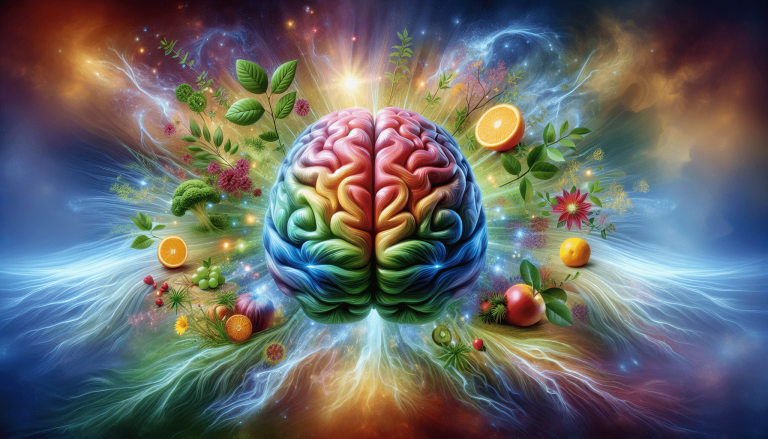What Are The Best Vitamins For Your Brain?
You may not realize it, but your brain has its own set of nutritional needs in order to function at its best. That’s why it’s important to make sure you’re getting the right vitamins to support your cognitive health and overall brain function. In this article, we will explore the best vitamins for your brain and how they can help improve your memory, focus, and overall brain health. So, if you’re looking to give your brain a boost, keep reading and discover the vitamins that can help unlock your brain’s full potential.
Vitamin B12
Improves brain function
Vitamin B12 is a crucial nutrient that plays a significant role in supporting brain function. It is known for its ability to optimize the functioning of the nervous system, ensuring that communication between brain cells is smooth and efficient. When you have sufficient levels of vitamin B12, you may experience improved cognitive skills, such as sharper memory, enhanced focus, and increased mental clarity. This essential vitamin is involved in the production of neurotransmitters, which are signaling molecules that transmit messages between brain cells. By promoting proper neurotransmitter function, vitamin B12 helps improve overall brain health and functionality.
Protects against cognitive decline
As you age, cognitive decline becomes a concern for many individuals. However, incorporating vitamin B12 into your diet may help prevent or slow down this decline. Research suggests that individuals with low levels of vitamin B12 may be at a higher risk of developing conditions such as dementia and Alzheimer’s disease. By ensuring an adequate intake of vitamin B12, you can potentially protect your brain from age-related cognitive decline and maintain optimal brain health.
Sources: meat, fish, eggs, dairy products
To obtain sufficient amounts of vitamin B12, it is important to include foods that are rich in this nutrient in your diet. Some excellent sources of vitamin B12 include meat, fish, eggs, and dairy products. For meat lovers, lean cuts of beef and poultry can provide ample amounts of vitamin B12. Seafood lovers can turn to fish like salmon, trout, and tuna, which are not only delicious but also packed with this essential nutrient. If you follow a vegetarian or vegan diet, incorporating fortified plant-based milk and cereals into your meals can help you meet your vitamin B12 requirements.
Vitamin D
Promotes brain development
Vitamin D, often known as the “sunshine vitamin,” is not only essential for bone health but also plays a critical role in brain development. Adequate levels of vitamin D during development have been associated with improved cognitive function later in life. This is particularly important for children, as vitamin D deficiency during critical periods of brain development may increase the risk of neuropsychiatric disorders and cognitive impairments. By ensuring sufficient vitamin D intake, you can support your brain’s growth and development from an early age.
Regulates neurotransmitters
In addition to its role in brain development, vitamin D also plays a crucial role in regulating neurotransmitters. Neurotransmitters are responsible for transmitting signals between brain cells, allowing for seamless communication within the brain. Vitamin D helps maintain the balance of these signaling molecules, which in turn, promotes optimal brain function. By ensuring adequate levels of vitamin D, you can support the proper functioning of neurotransmitters and regulate brain activity effectively.
Sources: sunlight, fatty fish, fortified foods
The primary source of vitamin D is sunlight, as your skin produces this vitamin when exposed to ultraviolet B (UVB) rays. Spending time outdoors, especially during the midday sun, can help your body produce vitamin D naturally. However, it is important to balance sun exposure with the need to protect your skin from harmful UV radiation. If you live in an area with limited sunlight or during winter months when sunlight exposure may be reduced, incorporating vitamin D-rich foods into your diet is essential. Fatty fish like salmon, mackerel, and sardines are excellent sources of this vitamin. Additionally, fortified foods such as fortified milk, orange juice, and cereals can provide a good amount of vitamin D.

Omega-3 Fatty Acids
Boosts brain health
Omega-3 fatty acids have been recognized for their numerous health benefits, and their positive impact on brain health is no exception. These essential fats are crucial for brain function and structure, with a significant portion of the brain’s weight being composed of omega-3 fatty acids. Research has shown that consuming omega-3 fatty acids can improve overall brain health, reduce inflammation, and support the growth and development of brain cells.
Enhances memory and cognitive function
Omega-3 fatty acids are particularly well-known for their ability to enhance memory and cognitive function. These fats play a crucial role in the formation and maintenance of the myelin sheath, a protective covering around nerve fibers that allows for efficient communication between brain cells. By ensuring an adequate intake of omega-3 fatty acids, you can support optimal cognitive function, improve memory retention, and enhance overall brain performance.
Sources: fish oil, flaxseed oil, walnuts
To incorporate omega-3 fatty acids into your diet, there are several excellent sources to choose from. Fish oil, derived from fatty fish such as salmon, mackerel, and sardines, is a popular and potent source of omega-3 fatty acids. Alternatively, if you follow a plant-based diet, flaxseed oil, and walnuts are great options. Flaxseed oil is rich in alpha-linolenic acid (ALA), a type of omega-3 fatty acid, while walnuts provide a combination of ALA and other beneficial nutrients for brain health.
Vitamin E
Antioxidant properties protect brain cells
Vitamin E is a powerful antioxidant that plays a critical role in protecting brain cells from damage caused by harmful free radicals. These free radicals can cause oxidative stress, which has been linked to neurodegenerative diseases and age-related cognitive decline. By incorporating vitamin E into your diet, you can help combat the damaging effects of free radicals, reduce oxidative stress, and maintain the health of your brain cells.
May reduce the risk of Alzheimer’s disease
Research suggests that vitamin E intake may be associated with a reduced risk of developing Alzheimer’s disease, a progressive neurological disorder characterized by memory loss and cognitive decline. While more studies are needed to fully understand the relationship between vitamin E and Alzheimer’s disease, it is believed that the antioxidant properties of vitamin E contribute to its potential protective effects on brain health.
Sources: nuts, seeds, vegetable oils
If you’re looking to add vitamin E to your diet, there are several delicious and nutritious sources to choose from. Nuts, such as almonds and hazelnuts, are excellent sources of vitamin E. Additionally, incorporating seeds like sunflower seeds and pumpkin seeds into your meals can provide a good amount of this essential vitamin. Vegetable oils, including sunflower oil and olive oil, can also be used to increase your vitamin E intake.

Vitamin C
Neutralizes harmful free radicals
Vitamin C is well-known for its immune-boosting properties, but it also plays a vital role in brain health. As an antioxidant, vitamin C helps neutralize harmful free radicals in the body, including those that can cause damage to brain cells. By reducing oxidative stress and protecting against free radicals, vitamin C supports overall brain health and helps maintain cognitive function.
Enhances mental agility
In addition to its antioxidant properties, vitamin C is also involved in the production of neurotransmitters. Neurotransmitters are essential for proper brain function, as they help regulate mood, memory, and cognitive processes. By ensuring an adequate intake of vitamin C, you can enhance mental agility, improve focus, and support overall brain performance.
Sources: citrus fruits, bell peppers, strawberries
To increase your vitamin C intake, you can incorporate a variety of delicious and colorful fruits and vegetables into your diet. Citrus fruits, such as oranges, grapefruits, and lemons, are excellent sources of vitamin C. Bell peppers, particularly the red and yellow varieties, are also rich in this essential vitamin. Additionally, strawberries, papayas, and kiwis are great options to consider when looking to boost your vitamin C levels.
Vitamin K
Improves memory and cognitive skills
Vitamin K is a vital nutrient for brain health, known for its role in improving memory and cognitive skills. Research suggests that vitamin K can enhance episodic memory, which is the ability to remember specific events and details. By incorporating vitamin K into your diet, you can potentially support memory retention, improve cognitive function, and enhance overall brain performance.
Protects against neuronal damage
In addition to its memory-enhancing properties, vitamin K also offers neuroprotective benefits. It helps protect brain cells from damage caused by oxidative stress and inflammation, both of which can contribute to neurodegenerative diseases. By supporting the health and integrity of neurons, vitamin K plays a crucial role in maintaining optimal brain function.
Sources: leafy green vegetables, broccoli, eggs
To ensure an adequate intake of vitamin K, it is recommended to include a variety of leafy green vegetables in your meals. Vegetables such as kale, spinach, and broccoli are excellent sources of this valuable nutrient. Additionally, eggs are also a source of vitamin K, making them a versatile and nutritious addition to your diet.
Magnesium
Enhances learning and memory
Magnesium is an essential mineral that plays a critical role in brain health and function. It is involved in various processes within the brain, including learning and memory. Research has shown that magnesium levels affect synaptic plasticity, which is the ability of brain cells to form new connections and adapt. By ensuring sufficient magnesium intake, you can support optimal brain plasticity, enhance learning abilities, and improve memory retention.
Regulates neurotransmitters
In addition to its role in learning and memory, magnesium also plays a crucial role in regulating neurotransmitters. Neurotransmitters, such as serotonin and dopamine, are essential for transmitting signals within the brain. By maintaining the balance of these signaling molecules, magnesium helps regulate mood, enhance focus, and support overall brain function.
Sources: dark chocolate, nuts, legumes
If you’re looking to increase your magnesium intake, there are several delicious and nutritious options to consider. Dark chocolate, with its rich cocoa content, is not only a satisfying treat but also a good source of magnesium. Nuts, such as almonds and cashews, are also magnesium-rich options. Additionally, legumes like black beans and lentils can provide you with ample amounts of this essential mineral.
Zinc
Essential for nerve signaling
Zinc is an essential mineral that plays a vital role in supporting nerve signaling within the brain. It is involved in the release and regulation of neurotransmitters, which are critical for transmitting signals between brain cells. By ensuring sufficient zinc intake, you can support optimal nerve signaling, enhance brain communication, and support overall cognitive function.
Supports memory and focus
In addition to its role in nerve signaling, zinc also plays a crucial role in supporting memory and focus. Research has shown that zinc deficiency may impair memory and cognitive function. By maintaining adequate zinc levels, you can potentially enhance memory retention, improve attention span, and support optimal cognitive performance.
Sources: oysters, beef, pumpkin seeds
To ensure a sufficient intake of zinc, there are several excellent food sources available. Oysters have the highest concentration of zinc among all foods, making them a fantastic source of this mineral. Beef and other lean meats are also rich in zinc. For individuals following a plant-based diet, incorporating pumpkin seeds into your meals can provide you with a good amount of this essential mineral.
Folate
Key role in brain development
Folate, also known as vitamin B9, plays a key role in brain development, particularly during fetal development. Adequate folate intake is crucial for proper brain and spinal cord formation in the early stages of life. Moreover, folate plays a crucial role in the production of neurotransmitters and promotes healthy brain function throughout life.
Improves mood and mental clarity
Folate is involved in the synthesis of serotonin, a neurotransmitter that regulates mood and emotions. Inadequate folate levels have been linked to an increased risk of depression and other mood disorders. By ensuring an adequate intake of folate, you can potentially support mental well-being, improve mood, and enhance mental clarity.
Sources: leafy green vegetables, beans, fortified grains
To increase your folate intake, incorporating leafy green vegetables into your meals is an excellent choice. Vegetables such as spinach, kale, and Brussels sprouts are rich sources of folate. Additionally, beans, lentils, and other legumes are also great sources of this important nutrient. Fortified grains, including breakfast cereals and bread, can also provide a significant amount of folate.
Iron
Carries oxygen to the brain
Iron is an essential mineral that plays a critical role in carrying oxygen to the brain. It is a key component of hemoglobin, a protein in red blood cells that transports oxygen throughout the body. By ensuring adequate iron levels, you can support optimal oxygen supply to the brain, enhance cognitive function, and improve overall brain health.
Supports cognitive function
In addition to its role in oxygen transport, iron also supports cognitive function. Research has shown that iron deficiency can impair cognitive abilities, attention, and memory. By maintaining sufficient iron levels, you can support optimal cognitive performance, improve focus, and enhance overall mental functioning.
Sources: red meat, poultry, spinach
To ensure an adequate iron intake, incorporating certain foods into your diet can be beneficial. Red meat, such as beef and lamb, is an excellent source of heme iron, which is highly bioavailable and easily absorbed by the body. Poultry, such as chicken and turkey, also provides a good amount of iron. For vegetarians and vegans, incorporating iron-rich plant-based foods like spinach, lentils, and tofu can help meet their iron requirements.
By incorporating these essential vitamins and minerals into your diet, you can provide your brain with the necessary nutrients it needs to function optimally. Whether you choose to include meat, fish, eggs, dairy products, or opt for plant-based sources, it’s important to find a balance that suits your dietary preferences and needs. Remember, always consult with a healthcare professional or registered dietitian before making any significant changes to your diet or supplement routine. Take care of your brain by nourishing it with the vitamins and minerals it needs to thrive.
Additional Resources

Brilliant scientists managed to revoke Alzheimer, dementia and 3 other types of brain diseases in 100% of cases.
It was the biggest trial ever run on 7,000 people, from mild to severe memory loss disease. You can check their findings here.
It took them 4 years and a lot of sweat and blood but in the end they actually discovered the real root cause of brain damage and why diseases like Alzheimer and dementia happen to millions these days.
Right now a handful of people can still access their findings and the recommendations that so far has helped over 7,000 people during their clinical trial to revoke their memory loss and even escape the terrible Alzheimer and dementia.







